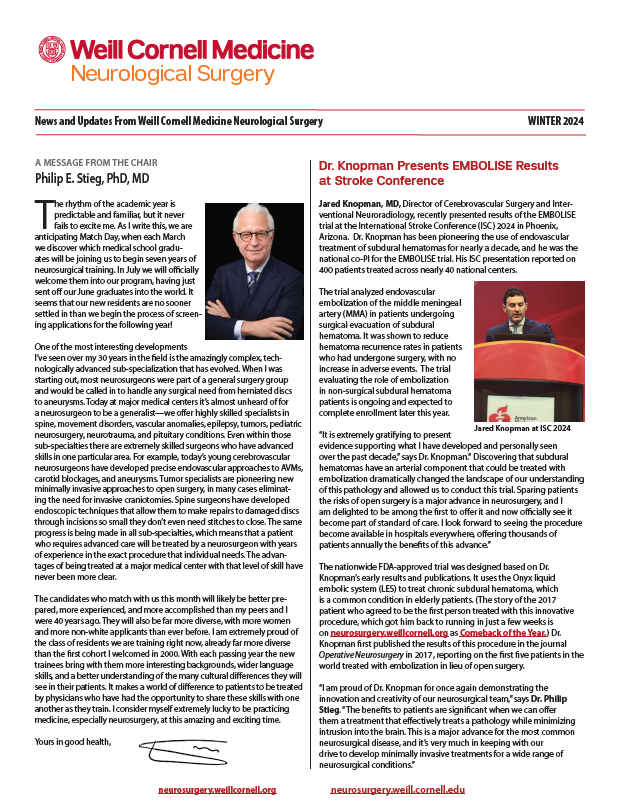
The rhythm of the academic year is predictable and familiar, but it never fails to excite me. As I write this, we are anticipating Match Day, when each March we discover which medical school graduates will be joining us to begin seven years of neurosurgical training. In July we will officially welcome them into our program, having just sent off our June graduates into the world. It seems that our new residents are no sooner settled in than we begin the process of screening applications for the following year!
One of the most interesting developments I’ve seen over my 30 years in the field is the amazingly complex, technologically advanced sub-specialization that has evolved. When I was starting out, most neurosurgeons were part of a general surgery group and would be called in to handle any surgical need from herniated discs to aneurysms. Today at major medical centers it’s almost unheard of for a neurosurgeon to be a generalist—we offer highly skilled specialists in spine, movement disorders, vascular anomalies, epilepsy, tumors, pediatric neurosurgery, neurotrauma, and pituitary conditions. Even within those sub-specialties there are extremely skilled surgeons who have advanced skills in one particular area. For example, today’s young cerebrovascular neurosurgeons have developed precise endovascular approaches to AVMs, carotid blockages, and aneurysms. Tumor specialists are pioneering new minimally invasive approaches to open surgery, in many cases eliminating the need for invasive craniotomies. Spine surgeons have developed endoscopic techniques that allow them to make repairs to damaged discs through incisions so small they don’t even need stitches to close. The same progress is being made in all sub-specialties, which means that a patient who requires advanced care will be treated by a neurosurgeon with years of experience in the exact procedure that individual needs. The advantages of being treated at a major medical center with that level of skill have never been more clear.
The candidates who match with us this month will likely be better prepared, more experienced, and more accomplished than my peers and I were 40 years ago. They will also be far more diverse, with more women and more non-white applicants than ever before. I am extremely proud of the class of residents we are training right now, already far more diverse than the first cohort I welcomed in 2000. With each passing year the new trainees bring with them more interesting backgrounds, wider language skills, and a better understanding of the many cultural differences they will see in their patients. It makes a world of difference to patients to be treated by physicians who have had the opportunity to share these skills with one another as they train. I consider myself extremely lucky to be practicing medicine, especially neurosurgery, at this amazing and exciting time.
This essay first appeared in the Winter 2024 issue of our department newsletter. Read the entire issue here.